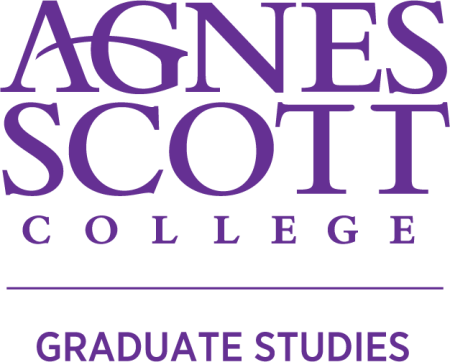A community of forward thinkers can be found nestled in the campus of Agnes Scott College.

These students believe in offering mental health support to those marginalized within our society, and are committed to learning an intersectional approach to provide that support. Together, they are working to become Licensed Professional Counselors through Agnes Scott’s Clinical Mental Health Counseling master’s program.
From the moment students enroll, they are not only immersed in a close-knit
community with small class sizes – they receive individual attention from professors who specialize in a variety of cutting-edge theories in mental health practices.
Clinical Mental Health Counseling faculty at Agnes Scott are not just instructors – they maintain research and continue working as clinicians. For example, Dr. Mary Chase Mize manages a small private practice that is influenced by her scholarly work on older adult populations, bereavement, and suicidality. Concurrently, her expertise funnels to students as she teaches courses such as Human Growth and Development Across the Lifespan. Another faculty member, Dr. Danielle Dunkley continues her work in private practice and as a researcher in the North Atlanta area. She commonly teaches the courses Principles and Techniques of Counseling and Addictions and Substance Abuse. She applies the same care from her clinical and supervision work directly to students’ learning in the classroom.

The Clinical Mental Health Counseling curriculum empowers students to enter a world ready to help diverse populations. Every faculty member provides innovative teaching that seamlessly weaves race, sexuality, gender, and other aspects of identity into students’ coursework — a learning experience that truly stands out from others.

According to the Program Director, Dr. Jennifer Fulling-Smith, Ph.D. LPC (CO & GA), ACS, RPT-S, “we approach core areas of counseling with intersectional frameworks so that graduates will enter the field not only as well-trained, skilled counselors, but also counselors who can truly engage in the social challenges clients face due to the oppression they experience. Our program prepares its graduates to make a lasting impact in the community.”
An intersectional approach to counseling allows clinicians to see clients with all their diverse identities, including the impact of oppression and discrimination on their clients. Every course in the program is designed to support students’ commitment to work with diverse populations, and to approach mental health through a holistic lens that accounts for the complexity of human identity and experience. In their foundational courses, students are encouraged to explore their own cultural background, self-identity, and worldview, and to understand how their implicit biases and perspectives influence the counseling process. Understanding the diversity of human expression, students are educated to become professionals who are equipped to interact with clients and stakeholders from a global perspective.
The emphasis on educating forward-thinking counselors through an intersectional approach is a natural extension of the mission of Agnes Scott College. With a mission and culture that believes in big questions, global perspectives, and leading change, this community of counseling students is leading the path to effectively meet the changing mental health needs of our society.

Classes are available in a daytime or evening cohort. During the program, students complete a practicum and internship at sites throughout the metro Atlanta area. Dr. Mary Huffstead, Assistant Professor and Clinical Site Coordinator built a dynamic system of relationships with various sites in the metro Atlanta area to serve as practicum and internship sites for counseling students.
The direct relationships to the sites allows students to engage in the practical application of clinical techniques, a requirement for the path to licensure. After five consecutive semesters of primarily in-person instruction, students are well-prepared to take the licensure exam required to apply to become a licensed professional counselor.
For more information
For more information and admission requirements for the Master of Arts in Clinical Mental Health Counseling program at Agnes Scott College, visit our website.


